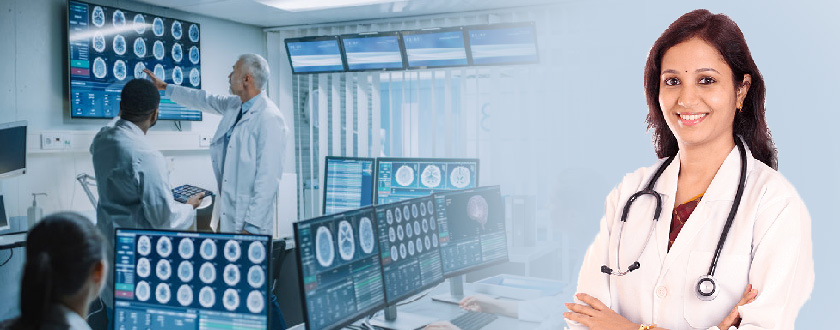Neurology
- General Medicine & Internal Medicine
- General Surgery
- Critical Care & Emergency Medicine
- Orthopedics & Arthroscopic Surgery
- Joint Replacement surgery
- Obstetrics & Gynecology
- Pediatric Medicine & Pediatric Critical Care
- Pediatric Surgery
- Cardiology
- Endocrinology & Diabetology
- Nephrology
- Urology & Genitourinary Surgery
- Medical Gastroenterology
- Surgical Gastroenterology
- Neurology
- Neuro & Spine Surgery
- ENT
- Laparoscopic General Surgery
- Poly Trauma
- Opthamology
- Medical Oncology
- Surgical Oncology
- Plastic & Corrective Surgery
- Hepatology
- Dermatology
- Rheumatology
- Vascular Surgery
- Dental & Facio Maxillo Surgery
- Psychiatry & Family counseling
- Radiology
- Homeopathy
- Advanced Physiotherapy

NEUROLOGY
Neurology is the medical speciality focusing on the diagnosis and treatment of conditions that affect the brain and nervous system, as well as the spinal cord, blood vessels, muscles, and nerves. These conditions are treated by physicians in two related specialities: neurology services and neurosurgery.
Our Neurologists use diagnostic tests like electroencephalograms (EEG), magnetic resonance imaging (MRI), and computer-assisted tomography (CAT) scans to identify neurological conditions. Our Doctors are specialized in the treatment of neurodevelopmental disorders, learning disabilities, pain management, and other chronic conditions.
Common neurological disorders that a neurologist treats here include headaches, sleep disorders, tremors, epilepsy, brain and spinal cord injuries, brain tumours, strokes, Alzheimer's disease, Parkinson's disease, multiple sclerosis (MS), amyotrophic lateral sclerosis (ALS), and peripheral nerve disorders.
An infrastructure that boasts of being in sync with international standards and specialist doctors have led to this hospital becoming a preferred centre for treatments of neurological disorders.
State-of-art operating rooms full-fledged with the latest equipment speaks of the modernised
Technologically infrastructured neuro intensive care unit along with post-operative neuro intensive care unit.
Besides we have a stroke intensive care unit full-fledged with specialized equipment
Exclusive movement disorder programme organized for patients suffering from advanced Parkinson's disease, severe tremor and general dystonias
Specialized stroke programme arranged for patients having an ischemic stroke
Specialized services like Digital Subtraction Angiography (DSA) which detects deformities in the blood vessels present within your brain is available at our Neurology department
Vascular procedures performed using DSA suite
More than 1000 major neurosurgeries are carried out every year in the neurosciences department of this hospital.
Surgeons regularly handle patients suffering from epilepsy, diabetic neuropathy, myopathy, movement disorders etc.
Advanced and fully-equipped neuro-physiology laboratory on the premises of a hospital
Many complex surgeries for the treatment of spinal tumours, spinal dislocation, Parkinson's etc. are also performed by the talented neurosurgeons
Pediatric neurological disorders are treated by eminent neurologists who are a part of this hospital
The hospital provides neurorehabilitation to their patients undergoing neurological surgeries.
Headache
Headaches are one of the most common neurological disorders—and there are a variety of different kinds of headaches, such as migraines, cluster headaches, and tension headaches. When headaches occur repeatedly, it’s a good sign that you should see a doctor, as it could be a symptom of an underlying condition. Our Neurologist typically discusses your symptoms to help determine what’s causing your headache. If we find that you’re just experiencing a migraine, we can prescribe you medication to alleviate your symptoms. If your condition is something serious, such as temporal arteritis, we often prescribe a steroid to reduce inflammation. The medication will help you avoid complications such as vision loss.
Stroke
Strokes occur when you experience damage to the brain as a result of arteries leading to and within the brain becoming impaired
When we see people who have experienced a stroke, our priority is to help them prevent a second stroke. We often do this through medication, which can include blood thinners or drugs to treat any underlying heart problems, but it depends on your particular situation. Our Neurologist suggests lowering stroke risk by exercising 30 minutes a day, five days a week, and by following a healthy diet that prioritizes fruits and vegetables and limits processed food.
Seizures
Seizures are changes in the brain’s electrical activity and signs and symptoms of a seizure can vary depending on the severity of your seizure, but the most common include:
- Cognitive or emotional symptoms, such as fear and anxiety.
- Loss of consciousness or awareness
- Temporary confusion
- Uncontrollable jerking movements of the arms and legs
Early treatment and medication can control your seizures, and you will avoid long-term complications such as memory loss and brain damage and our doctors in the Neurology wing work on the probable causative factor in each patient and treat with suitable therapy.
Parkinson’s disease
Parkinson’s disease is a progressive nervous system disorder that affects your movement. Generally, it begins affecting people around age 60, and symptoms gradually get worse over time.
Our doctors have the expertise to diagnose Parkinson’s disease during a visit in which you discuss your symptoms and undergo a physical examination. In many cases, they help you to alleviate symptoms and manage Parkinson’s disease effectively through medication.
Dementia
Dementia is an umbrella diagnosis that describes a group of diseases, including Alzheimer’s that may cause your brain to fail. Dementia, which becomes increasingly more likely as you age, leads to continuous loss of brain tissue, which can affect: the brain functioning in a subtle way.
Our Neurologists are trained to diagnose if you may be experiencing symptoms of dementia on examination, Some medications and therapies will be suggested and this can help you manage symptoms. Moreover, your doctor will connect you with support groups to help you manage life with dementia.
